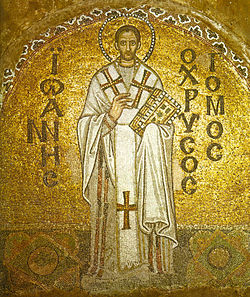398
John Chrysostom becomes Patriarch of Constantinople
John Chrysostom (349-407) was honoured as a saint, named a Doctor of the Church and hailed as one of Christianity’s greatest preachers but ended his life in disgrace and on his way to exile.
John was born in Antioch, the principal city of the Greek-speaking eastern part of the Roman empire. He studied rhetoric under the great pagan orator Libanius but was drawn to Christianity, spending some time as a hermit, praying and studying scripture. On his return to Antioch he was ordained a priest and gained such a strong reputation as a preacher that he was given the nickname “Chrysostom” or “Golden Mouth”.
In 398 when the position of archbishop of Constantinople, the second-highest church position after the Bishop of Rome, became vacant John was nominated to the post without his knowledge. His election to this coveted post was supposedly engineered by Eutropius, a eunuch and high-ranking imperial official. John learned of the election when a military detachment came to escort him to Constantinople. (The troops were necessary because the notoriously-excitable population of Antioch might have rebelled at learning of John’s departure.)
Unfortunately, John’s tenure as archbishop was marred by court intrigues, disputes with the still-powerful Arian faction in the capital and his tendency to speak honestly and openly about the vices of the imperial family. As a result of offending the emperor and empress he was ordered into exile in 405. When his voice proved to be still influential even at a distance he was sent even deeper into exile but died en route.
John’s impact on the Church as a liturgist, preacher and theologian remains profound.
